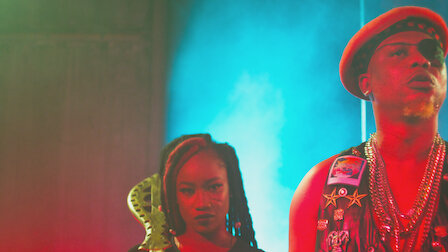KING OF BOYS: THE RETURN OF THE KING, EPISODE 6 “TROUBLE SLEEP” REVIEW
by Mr. X Born in the 90’s, I have witnessed a few Nigerian electoral tensions; the political parley of the cunning, the noble and the half-witted all gunning for power. Not to mention the carnivalesque rallies, the lofty promises, the media buzz, the sweeping thrills of an election year, and the shrills of political parties tearing at one another for the grand prize. King of Boys: the Return of the King, for all its political appellations, fails to deliver on this front. The penultimate episode – Trouble sleep kicks off with a disdainful greeting from Eniola Salami to the inglorious ‘table’. She does this through a phone call delivered by her chief henchman, Ade Tiger. As is normal, the members of the table spearheaded by Odudubariba, mock her bloated pride and register their disappointments at Eniola for not showing up for the meeting. In what starts to have the feel of similar scenarios from past episodes, Odudubariba makes a daring request to be named head of the table. At first it appears as though he’s found his luster as one deserving of the crown but we quickly see through him. It’s a façade. Like a child picking his words, his composure shrinks into his purple suit as he makes his proposition. He’s as timid as they come, desperately seeking validation from a woman who refuses to be flattered by his flimsy show of force. It becomes clear that Eniola’s absence is as imposing as her presence. She proves this by offering a proposition of her own — Odudubariba becomes head of the table if she’s assured victory at the gubernatorial polls and the President, a second term in office. A fair deal it seems to the members of the table but confusing it is to me. Given the measure of authority she boasts and her steep rise in the political ranks, does Eniola Salami really need the ruling of the table to become Governor? Safe to assume it’s all a ploy by Eniola to keep the table groping at false hopes. And if that’s not the case, the relevance of the scene is poked with logical questions. With two weeks to the elections, we are teased with a gubernatorial debate. A glorious opportunity for Eniola to prove her caliber to her oppositions and strengthen her claim to the seat. Well, sadly, the debate never makes it to the screen. Rather, it’s condensed to a face-off between Eniola Salami and Jumoke Randle, again! Set at the backstage of the debate hall. This time, the women go toe to toe in the same ol’ same ol’ battle of words spiced with adages that douse rather than enrich the dialogue. The only thing different here is the shocking revelation Eniola makes about the debauched past of Jumoke Randle. Jumoke stands pinned to the ground, utterly embarrassed, as Eniola spills the grim details to the ears of her aide. For the first time, Eniola puts herself at par with Jumoke only on the basis of their humble beginnings. But she’s quick to dignify herself as one who knows who she is, as opposed to Jumoke, who claims to be who she’s not. Again, Eniola comes out of another face-off victorious. And again, one of the many unexploited moments of real political intrigue in the KOB series— here, the thrill of a political debate— is sacrificed for grandiosity. In the subsequent scenes, a bloody shootout between Makanaki’s goons and Eniola’s guards, followed by a car explosion, reports Eniola to be feared dead. The story arc of Dapo, the disgruntled reporter, reaches a cathartic curve in this episode. Having been subjected to a sketchy plot in the series so far, we finally learn the cause of the strain in the relationship with his estranged wife. And yes, it involves a dead child. What begins as a banter grows into a crescendo. Both armed with a point to prove. The camera work cloaks us in with tight closeups, keen on the couple both venting their pent-up resentments. But the performances from the scene protagonists, soon betray our interest. It loses rhythm as quickly as it settles into one. Bouncing out of tune and struggling to sustain the emotional charge it promised. Could be that the actors, Efa Iwara and Tope Olowoniyan, as is true of a host of other actors in the series, choose to overindulge the scale of the project, and in effect, lose the honesty in their deliveries? In the heat of the quarrel, Dapo is distracted by the news of Eniola’s feared death, to the distaste of his wife who reiterates his priority for work over family. Noteworthy here is that Efa Iwara’s character is peculiar to the present ethos of disgruntled Nigerian youths. Young men and women torn between love for their country and perpetual doubt of their future. And the only way out is a forceful escape in search of ease a.k.a. Japa. The dissatisfying portrayal of Efa’s character, as one without ease not from his country nor from his personal life, only affirms the scare that patriotism is of little significance and holds no merit for the Nigerian youth. Apparently, Eniola Salami is not dead. She and her guards survived the car explosion. The suspected bomber is brought before Eniola. He confesses to have been hired by one of Eniola’s trusted guards with strong evidences to prove it. Eniola, fueled by her younger self for vengeance, struggles with the demands. As needlessly frequent as these visits have been, this time it manages to hold our interest. Eniola is subdued, helpless and ultimately loses the fight. Drenched in fury, she succumbs to her blood-thirsty younger self and stabs the traitor in the heart. A new Eniola emerges, one coalesced with her darker self, completely disproving the hints of repentance she showed in previous episodes. The final beats of the episodes feature two inciting scenes for the drama that is to come in the final episode: Eniola’s meeting with Aare with the


